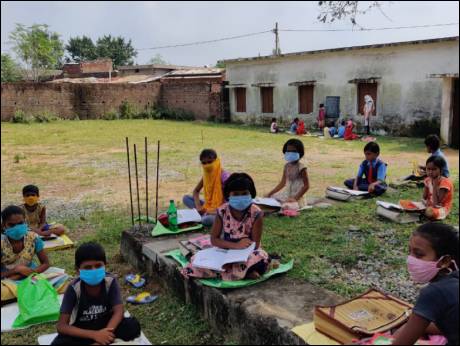
November 20 2020: The COVID-19 pandemic has led to disruptions in all walks of life. Schools, colleges and all other academic institutions have been forced to look for alternatives to ensure continuity in learning. In the past six months, across the world, various digital or ICT-based learning options have been explored. Most of these options have proved to be sub-optimal, pedagogically unsound and inadequate substitutes of face-to-face interactions. For school-going children, these have been particularly ineffective due to the deeply intimate nature of learning that is needed in the formative years of schooling. Not only that, the lack of access to devices and infrastructure has led to several children being left out from the process of learning. Emerging evidence also reveals that the endorsement of online learning solutions is often closely tied to the influence of market-based solutions, commercialisation of education, and a lack of belief and investment in the professional capacity of teachers.
With this backdrop, the Field Research Group at the Azim Premji Foundation undertook a study covering 1,522 teachers (in 1,522 schools) and 398 parents in the public school system across 26 districts in five states. These schools have more than 80,000 children from the most disadvantaged geographies across India. The objective of the study was to understand the challenges experienced by children and teachers in the implementation of online learning solutions within the public school system. The survey tools for teachers and parents were implemented primarily through telephonic discussions and were supplemented with a few open-ended questions for the teachers.
The survey of teachers and parents reveals the ineffectiveness of online learning solutions in providing meaningful learning opportunities, exclusion of majority of children due to poor access, and the professional frustration of teachers. This resonates with the findings from a recent rapid survey report that underscores the exclusion of over 80% students in public schools due to dependence on technology and ‘the complete lack of capacity building/support by state governments to deliver education digitally’ (Vyas 2020). Our study also reveals that contrary to popular beliefs, most parents are eager to send their children to schools with necessary health safeguards and do not think that health of their children would be affected in such an event.
Key Findings Finding 1: Online learning opportunities are ineffective in providing any actual education. Responses of overwhelming majority of the teachers show the complete inadequacy of delivering meaningful education through the online mode.
1.1 More than 80% teachers expressed the impossibility of maintaining an emotional connect with children in this mode.
1.2 More than 90% teachers responded that no meaningful assessment of children’s learning was possible in online classes.
1.3 Almost 50% teachers reported that children were unable to complete assignments shared during online classes, which in turn led to serious gaps in learning.
1.4 The data collected on both the frequency and duration of online classes suggests inadequate time spent with children for their learning.
1.5 Parents have, likewise, echoed their own dissatisfaction with 70% being of the opinion that online classes are not effective for the learning of their children.|
Finding 2: Almost 60% children cannot access online learning opportunities. Reasons for this varied from absence of a smartphone, multiple siblings sharing a smartphone, difficulty in using the Apps for online learning, etc. The issue of access is further exacerbated for children with disabilities. Among teachers of children with disabilities in their regular classes, more than 90% found them unable to participate in online classes.
Finding 3. The study also aimed to understand parents’ attitude and concerns towards interrupted learning caused due to the pandemic. Parents have overwhelmingly supported reopening of schools with the necessary safety protocols.
Almost 90% of the parents were willing to send their children to school with necessary health safeguards. Close to 65% were of the opinion that schools, when they reopen, would not pose a problem for their children’s health.
The open-ended questions that were implemented with a sample of teachers, reinforced the quantitative findings from the survey. The analysis of these questions clearly underlines the professional frustration of the teachers with online modes of teaching. The responses of teachers also reveal the initiatives that are being taken by them to find alternative, meaningful ways to engage with their children as the regular public school system continues to remain closed and inaccessible for a vast majority of the country’s school-going child population.
The inadequacy of the digital modes adopted by some of the states has also led state education departments backtracking on the online options and adopting more direct teaching-learning processes, with teachers visiting the families and school children, for example, Padhai Tuhar Para (education in your neighbourhood) scheme in Chhattisgarh; Hamara Ghar - Hamara Vidyalaya (our home - our school) in Madhya Pradesh and; Vidyagama in Karnataka.
Overall, the study is in alignment with other recent studies that have underscored the fallacy of resorting to online learning solutions for school-going children, especially in disadvantaged contexts. The study, thus, endorses the urgent need to reopen schools in a phased manner with due preparations for the health and well-being of both children and teachers while at the same time encouraging and facilitating teachers to pursue more community-based solutions for direct interactions with children in the interim period.
Link to full report